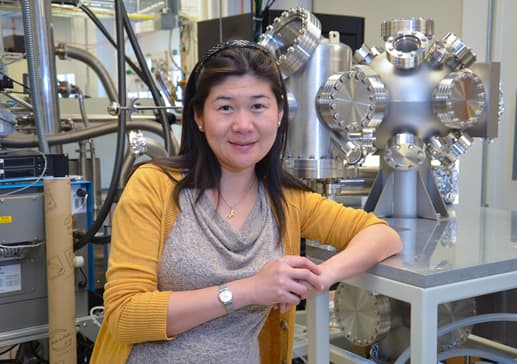Engineering professor receives NSF Early CAREER Award

Na Lu, an assistant professor in the Engineering Technology and Construction Management Department of the Lee College of Engineering, has won a $400,000 National Science Foundation CAREER award to further her research to develop cost-effective thermoelectric materials for high-temperature power generation through waste-heat harvesting.
The Faculty Early Career Development (CAREER) Program is the NSF’s most-prestigious award in support of junior faculty. CAREER grants are awarded to faculty who exemplify the role of teacher-scholars through outstanding research and excellence in education. The long-range goal of the program is to build a firm foundation for a lifetime of leadership in the integration of education and research.
Lu, who has been with the Lee College since 2009, holds a Doctor in Construction Education from Clemson University. Her research is primarily in the area of sustainable materials for infrastructural and energy applications. The CAREER award will provide funding to investigate new processing mechanisms of nanostructuring bulk nitrides and oxides to directly convert thermal energy into electricity for high-temperature thermoelectric power generation.
“Dr. Lu’s work involves the synthesis of new materials that will result in the next generation of high-temperature thermoelectric devices,” said Ian Ferguson, a research collaborator with Lu and the chairman of the Department Electrical and Computer Engineering. “Her NSF CAREER Award will result in highly manufacturable processes and the prevalence of these devices in many applications not previously considered possible.”
Lu said, “Essentially, what we will be looking at is designing and developing cost-efficient methods to produce materials for power generation by harvesting wasted heat. Currently, 60 percent of energy generated in US is wasted as heat, for instance gas exhaustion in car engines, large manufacturing process, etc.”
Such wasted heat could be directly converted into electricity through thermoelectric (TE) conversion. TE technology has many attractive features, such as being renewable, reliable, scalable and silent. Currently, TE technology uses toxic, rare and expensive elements. The few applications of TE technology are in deep space exploration and military functions.
“Much of wasted heat, especially in manufacturing, is at high temperatures in excess of 700 degrees Centigrade,” Lu said. “But they are unrecovered, because current TE materials can only withstand low operating temperatures. To address this issue, the goal of this CAREER program is to investigate new processing mechanisms for engineering thermally robust materials, such as oxides, with multi-length scale structures to improve their TE properties for high-temperature power generation.”